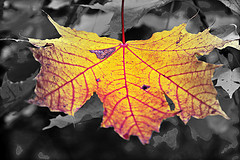Maple Syrup Miscreants Now Illegally Tapping Trees In Maine
Just because authorities apprehended some of the sticky-fingered bandits behind the $20 million theft of part of the global strategic maple syrup reserve in Quebec last year, that doesn’t mean that the world’s maple syrup supplies are safe. Oh, no. In Maine, authorities have found illegal taps on innocent maple trees on private property.
Proper maple syrup requires forty gallons of sap to make one gallon of syrup, boiled slowly to condense it into the sweet amber nectar. One tree can provide about ten gallons of sap, so you would need at least four trees to make one gallon. The solution to this problem is not “trespass on others’ property and tap their trees without their permission.”
Illegal tapping is actually a forestry-management problem: holes in large prize trees meant for furniture production can render an entire trunk useless for the industry. The illegal tapper has put twice as many larger-than-standard holes in the trees than one should, presumably to get the sap out faster without getting caught. This opens the trees up to disease and other badness.
By the way, authorities have made more arrests in the Global Strategic Maple Syrup Reserve heist, and have named at least one company, Vermont-based Maple Grove Farms, that was caught buying “hot” syrup. The company says that it acted in good faith, and there were no indications that the syrup was stolen. It’s not like someone pulled up to their office offering a tanker truck of syrup that “fell off a truck.”
Maple trees being illegally tapped in Maine [Montreal Gazette]
Want more consumer news? Visit our parent organization, Consumer Reports, for the latest on scams, recalls, and other consumer issues.


